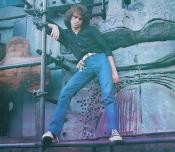 From Wikipedia, the free encyclopedia
From Wikipedia, the free encyclopedia
Raul Porchetto (born November 15, 1949) is an Argentine musician and song writer.
Porchetto emerged into the Acoustic movement of argentine rock during the early 1970s releasing his debut record in 1972 following the sub-genre's popular rise in the wake of the Acusticazo.
By the mid 70s he would become a member of the first and extremely ephemeral supergroup of Argentine rock, PorSuiGieco, with Leon Gieco, Charly Garcia, and Nito Mestre.
For the remainder of the 1970s Porchetto released an average of one LP a year. In 1980 his sixth album Metegol featured a very innovative type of uptown-suave sounding rock, yet remaining accessible and unpretentious when listened to. Metegol sent Porchetto's career to the top of Argentine rock. The album even beat out Seru Giran's third release Bicicleta, in a yearly rock survey by newspaper Clarín and when that group was the most popular act in Argentine rock. In a similar style Porchetto released Televisión in 1981.
Mirroring the early 80s trend towards the much more light and direct rock music of the New Democracy Sound, Raul Porchetto came out with his next two album releases. 1983's Reina Madre became one of the best selling rock albums until that time. He became the best attended solo act in concerts during the first half of the 80s.
But Porchetto grew tired of the Rock Star rat race. That along with his eagerness to pursue more experimental and ambitious music led his later releases following Reina Madre to be departures from his earlier sound, and more innacessible to casual fans (one of his late 80s albums even include actual choruses singing evangelical themes). Thus they did not sell nearly as well, and by the late 1980s Porchetto had largely disappeared from the mainstream radar. He has continued to come out with albums until the present day (but his last release was in 2002).
http://en.wikipedia.org/wiki/Raul_Porchetto